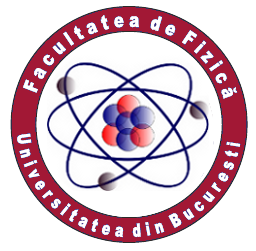RESEARCH FACILITIES
The PhD students of the Doctoral School of Physics at the University of Bucharest use/can access the research infrastructure of the Faculty of Physics, University of Bucharest, of the national research institutes on the Măgurele platform (the largest research center in Physics in Romania), and not only. Thus, they have the opportunity to become part of and even to be employed in competitive research groups.
The Faculty of Physics has a fully functional building located in Măgurele, which contains an auditorium (with 580 places), 3 lecture halls (150 places each), seminar rooms (24 places each), research and teaching laboratories, a computerized library (100 places) and depositories of books and periodicals. All lecture halls and seminar rooms are equipped with multimedia facilities.
On the Măgurele campus, located in the immediate vicinity of the faculty, the PhD students are lodged in studios in a recently renovated building (building G5, 120 places), and benefit from a sporting base. In addition, the PhD students have access to all sport complexes of the University of Bucharest.
In the Faculty of Physics, the PhDs can activate in any of the 9 research centers, equipped with modern facilities and addressing the specific topic of a defined direction of studies of the Doctoral School of Physics:
(i) The Research-Development Center for Materials and Devices for Electronics and Optoelectronics (MDEO); details on the equipment in this center can be found here
(ii) The Research-Development Center for Nanoscience and Alternative Energy Sources – 3Nano-SAE; details on the equipment in this center can be found here
(iii) The Research-Development Center “Nuclear Matter in Extreme Conditios”. Details on the equipment in this center can be found here
(iv) The Research Center in Molecular Biophysics
(v) The Research-Development Center for Polymers, Mesophases and Nonconventional Methods of Environmental Protection
(vi) The Research-Development Center for Atomic Physics and Astrophysics
(vii) The Research-Development Center for Photonics, Spectroscopy, Plasma, Lasers
(viii) The Research Center in Advanced Quantum Physics
(ix) The Research Center in Theoretical Physics
In the Faculty of Physics, the PhD students have access also to specific software in the vendor domain, such as Mathematica (for modelling, numerical and/or symbolic calculus), Origin (for data manipulation and graphical representation), Labview (for data acquisition and manipulation), as well as in the open-source domain, such as sagemath, octave, maxima (for modelling, numerical and/or symbolic calculus), scilab, qtiplot, gnuplot, gwydion (for data manipulation and graphical representation), abinit, berkeley gw, gpaw, psi3, quantum espresso, siesta (for complex atomistic simulation DFT şi GW).
The National Research-Development Institute in Physics and Nuclear Engineering “Horia Hulubei” (IFIN-HH) offers access to PhD students in the following centers/laboratories:
(i) The European-interest Facility ELI-NP (Extreme Light Infrastructure-Nuclear Physics)
(ii) The Excellence Research Center for Distributed Computing, Methodics, Physics and Participation in Large-Scale International Collaborations, CEXMECDIF
(iii) ROSPHERE Laboratory
(iv) The Tandem Accelerators Complex
The National Research-Development Institute for Lasers, Plasma and Radiation Physics (INCDFLPR) offers access to PhD students at the research infrastructure of:
(i) Low Temperature Plasma Physics Department. Details on the equipment in this center can be found here
(ii) Laboratory of Solid-State Quantum Electronics. Details on the equipment in this center can be found here
(iii) The Laser Spectroscopy Group
(iv) The Laser-Surfaces-Plasma Interactions Laboratory
The National Research-Development Institute for Materials Physics (INCDFM) offers access to PhD students at the research infrastructure of:
(i) Research Department for Condensed Matter Physics and Advanced Materials
(ii) CEUREMAVSU-Euro-Regional Centre for Studies of Advanced Materials, Surfaces and Interfaces
(iii) The Magnetism and Superconductivity Group
(iv) The Group of Optical Processes in Nanostructured Materials
The National Research-Development Institute în Optoelectronică (INOE 2000) offers access to PhD students at the research infrastructure of:
(i) Research Centre for Advanced Surface Processing and Analysis by Vacuum Technologies
(ii) RADO (Romanian Atmospheric Observatory
(iii) Optoelectronic Methods and Techniques for Cultural Heritage Restoration
(iv) Optospintronics
(v) Optoelectronic Methods with Biomedical Applications
(vi) Laboratory for Optospectral Methods for Water Quality Assessment (MOCA)
(vii) Infrastructure for Characterization and Diagnosis by Optical and Complementary Methods – INDICO
The PhD students employed by the National Research-Development Institute for Microtechnologies – IMT have access at the:
(i) Facility for micro-nanostructuring of devices and sytems
(ii) Facility for Design, Simulation, MIcro- and NAnoFABrication of electronic devices and systems (IMT-MINAFAB)
(iii) CENASIC - Research Centre for Integrated Systems Nanotechnologies and Carbon Based Nanomaterials
In addition, via the PhD supervisers, the PhD students of the Doctoral School of Physics could access the infrastructure of international facilities, such as the ATLAS Experiment , in particular the RD51 Collaboration: Development of Micro-Pattern Gas Detectors Technologies, the Unified Institute for Nuclear Research, Dubna, the European Centre for Theoretical Studies in Nuclear Physics and Related Areas, Trento, or the Institute de Physique Nucleaire, Orsay
The research activity of PhD students in the above-mentioned laboratories/centers/research institutes is supervised by the PhD supervisor and the members of the supervising commission.
The PhD students employed in research laboratories have full access to the infrastructure of the respective institution, and can even have direct access to some equipment after a training session. In addition, via the PhD supervisor, the PhD students can benefit of the infrastructure of the institute that employs the supervisor, if different from the institute that employs the PhD student.
If the PhD student needs to gain access to the research infrastructure of a different institute than that that hires the student or his/her PhD supervisor, he/she can obtain access based on Internal Regulations of the said institute. In general, the access to a research laboratory/center can be granted by the Director of the center, based on a written request made by the PhD student and endorsed by his/her supervisor. PhD students in this situation should contact the directors of the respective research laboratories/centers for specific information.
|


